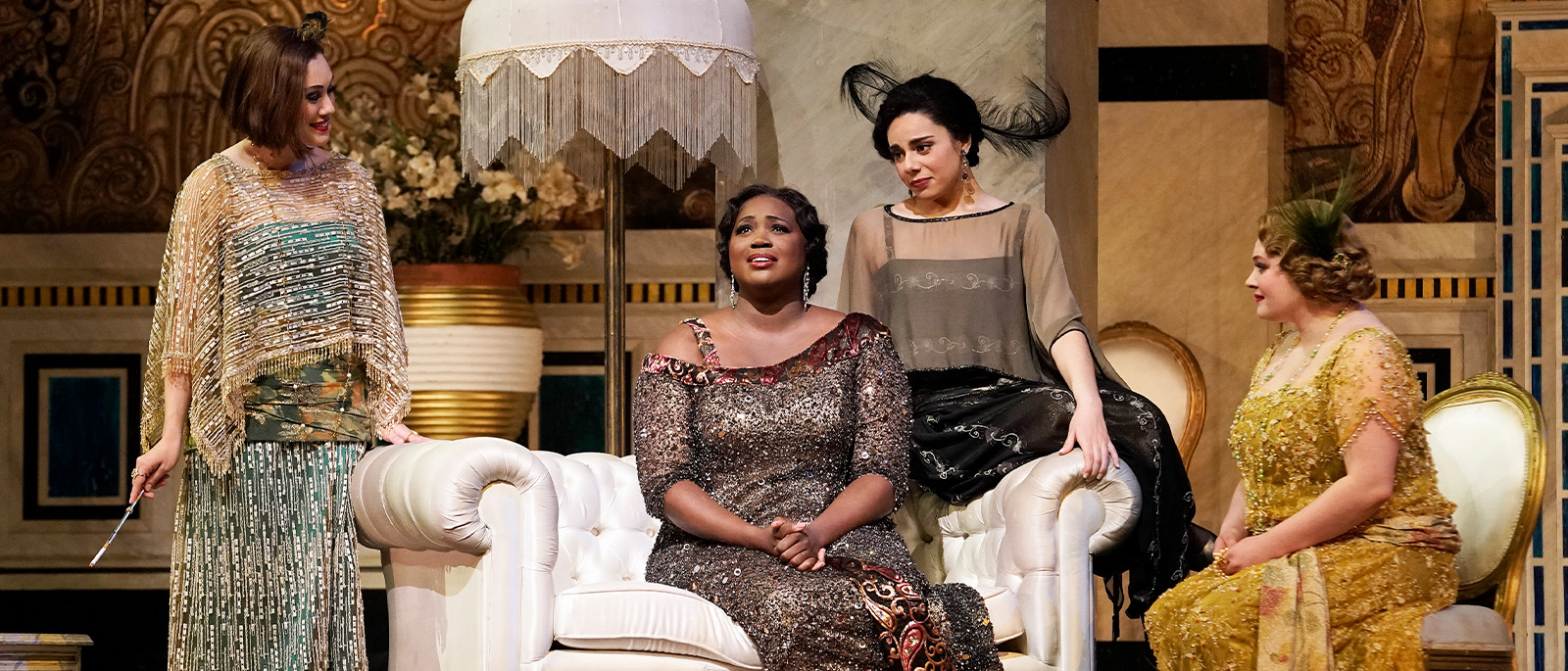
The Toast of Paris
This spring, celebrated soprano Angel Blue gives her first portrayal of the elegant Magda in Puccini’s La Rondine—a role she says feels tailor-made for her. In Nicolas Joël’s ravishing production, the bittersweet romance plays out against the glittering backdrop of 1920s Paris and the French Riviera. By Christopher Browner
The heroine of Puccini’s La Rondine (The Swallow), an enchanting but melancholic courtesan who yearns to fly free, only to have her wings clipped by social mores, would not immediately seem to be a relatable figure for Angel Blue, a 21st-century diva soaring through the stratosphere of the opera world. But Blue nevertheless feels a deep connection to Magda’s personality and predicament. “I was never a kept woman, of course, but when I was in my early 20s, I was very similar to her,” she recalls. “She struggles with indecision but is also very impulsive, and she doesn’t exactly know what she wants. I was like that. There are some points in this opera where it feels like I’m looking back on my younger self.”
Drawing on aspects of her artistry that led to Met triumphs as both Mimì in Puccini’s La Bohème and Violetta in La Traviata, Magda trades a life of caged luxury for the love of an idealistic young man, evoking Verdi’s perennial heartbreaker—albeit with a decidedly less tragic dénouement—and overflows with some of Puccini lushest melodies. Despite these similarities, though, Blue places Rondine in a category all its own. “The stories definitely have elements that are the same, but Mimì, Violetta, and Magda are three vastly different women—and so different musically, too,” she says. “To me, it’s feel-good music. The ending is still sad, but it’s one of those operas where people will leave uplifted.”
Blue has had the opera inside her since she was a teenager, though she realized it only later. She encountered Magda’s Act I aria “Ore dolci e divine” on Leontyne Price’s Puccini Heroines album, but only when she started learning the role in earnest did she discover its roots in La Rondine. “It’s so heartfelt and beautiful. Magda says, ‘Difendi, difendi, difendi il tuo cuore’—basically ‘Defend your heart,’” Blue explains. “When I was younger, my dad used to tell me, ‘Angel, guard your heart. Make sure that you find someone who loves you and will support you.’ My dad passed away almost 18 years ago, but in this aria, I can still hear him in my head.” It’s just one of Rondine’s treasures, along with Magda’s instantly recognizable “Chi il bel sogno di Doretta,” Ruggero’s stirring “Parigi! È la città dei desideri”—a perfect showcase for Blue’s co-star, tenor Jonathan Tetelman, in an important debut—and the entirety of the second act, which the soprano feels is perfect from start to finish.
Audiences at the April 11 performance of Turandot will also have the opportunity to hear Blue sing another Puccini heroine when she steps in as Liù, alongside soprano Christine Goerke in the title role. And Met audiences can expect even more from Blue in the future. During the 2024–25 season, she’ll appear in back-to-back new productions, starring as famed Spanish actress Margarita Xirgu in the company premiere of Osvaldo Golijov’s Ainadamar and taking on the title role in a new production of Verdi’s grand drama Aida. It’s a perfect pairing for an artist who has demonstrated mastery of both the standard repertoire and operas by today’s most significant living composers—including memorable recent performances in Terence Blanchard’s Fire Shut Up in My Bones. “I’m very honored that the Met trusts me with these two very important roles. It’s a lot of responsibility but also a great gift.”